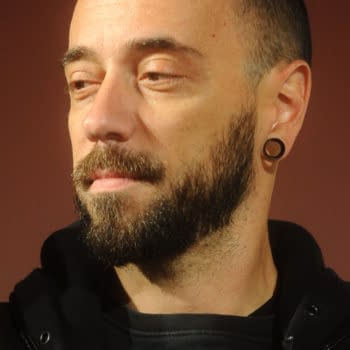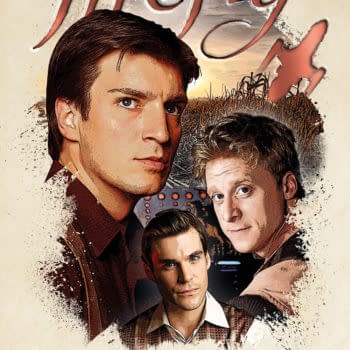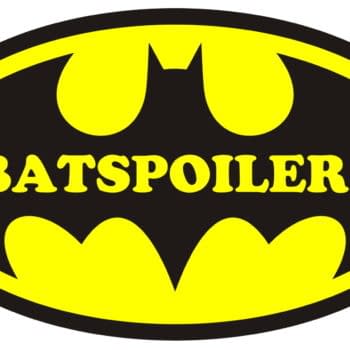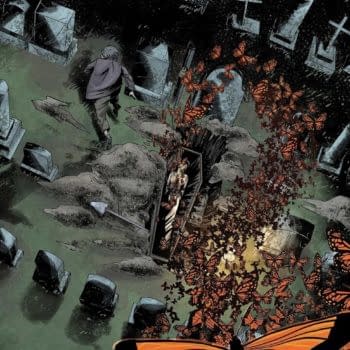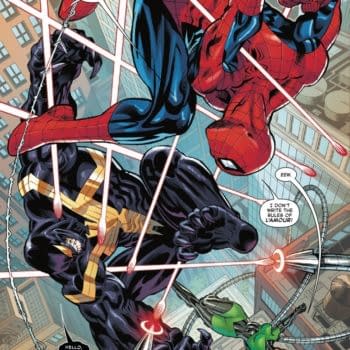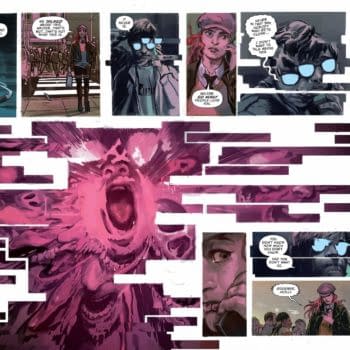Posted in: Comics | Tagged: clifford meth, stan lee
Mike Netzer Talks To Clifford Meth About Comic Book Babylon

And why he's now asked me to run this interview with himself and Clifford Meth over Meth's new Kickstarter appeal, Comicbook Babylon.
Michael writes and Clifford answers;
The efforts that you and a few others have made to help creators in distress are immeasurable. But there are tens, if not hundreds or even thousands of creators, who are at risk of falling into the need for such aid. Seeing how publishers and their corporate entities continue moving further away from providing a more level playing field for the creative force upon which they build their empire, do you think such "paramedic"-like efforts will be enough in the future, or will we need to nurture more of a "soldier"-like mentality to help try and avoid a more massive number of wounded creators, that's most certainly expected down the line, given the ongoing state of affairs?
We've been friends for a long time, Michael. We've often spoken around this issue and I'm grateful for the opportunity to talk about it in public… What's been needed, and what's already occurring, is a paradigm shift. Young people preparing to enter the comics' world as professionals have always thought of Marvel and DC as the gold standard, which in many respects they are—they have the money and the clout and these beloved, iconic intellectual properties—but they are certainly anything but top flight in terms of engendering healthy, long-term careers for their creators. When I was younger, the established path was you'd contribute to fanzines and then work your way up to the so-called independent publishers, the minor leagues. Eventually you hoped to be noticed by Marvel or DC. And once you cracked the ice there, you worked your ass off for a regular book, ideally hoping to land a key character or a popular series with an integrated back story.
But now it's dawning on creators that Marvel and DC merely allow you to establish street creds. Real creative freedom, solid financial independence comes after working for the Big Boys. Image proved that in a very big and loud way. Todd McFarlane and Jim Lee and the rest of that crowd changed the playing field. But the point is you're never going to make real money or build a career or have creative freedom or protect yourself from the infirmities of old age by working for Marvel or DC or the lesser big companies for any length of time. Eventually, they spit everyone out. It's the rare employee or creative independent who is able to nurse a career-long relationship with the BIGS. Walter Simonson and George Perez come to mind. But everyone with any sense begins to seek their own center. Joe Kubert and his school, Dave Simm and Aardvark-Vanaheim, and so forth.
And now, of course, there's CrowdFunding. The success of my own Kickstarter, which funded in just 24 hours, gives testimony to what you can do once people know you and your work.
As for the "soldier mentality," I prefer to think of it is Fraternal combustion. As Mark Vonnegut said to his father Kurt, we're here to help each other get through this thing, whatever it is. There will always be bad machines. But if men of good conscience do the right thing, a community that cares for its own, to greater and lesser degrees, is possible. It's like the old Jewish parable: How do you cover six people with one blanket? It's possible if each one is worried about covering the others. All good theory, yes, but in all practicality? A union would be nice. Collective bargaining is nice. If I'd been a member of the Writers Guild, a certain producer would have thought twice about trying to scam me. I hope that answers your question.
I've been talking since the late 70's about comics conventions being the most potent environment for raising the voice of creators, professionals and fans in protest of the oppressive policies of comic book publishers towards everyone who holds the industry dear to them. In light of how conventions and the convention circuit have grown over the last few decades, and the more institutionalized air about them, do you have a hope that creators will eventually make a lunge for the lead and start utilizing their presence there to help raise that voice? And if so, what will it take to get us all off our duffs?
I like conventions but they are too many things to too many people. Fans are there to meet creators and get drawings and buy stuff. Dealers are there to sell. Creators are there for ego and cash and maybe to hang out with folks they only see once a year. So I don't think the current convention scene is what you're talking about. The days of the Phil Sueling shows are long gone. I think you're talking about a Constitutional Convention. And that's hard to produce… What's needed, in the context of your question, is a secret society of Big Name Creators who want to pay things forward. You'd have to assemble, say, Alan Moore and Frank Miller and Jim Lee and Neil Gaiman and find Jack Kirby floating in a block of ice. Then this secret society of Big Name Creators could form a death pact and promise to stand by each other and their fellow creative geek mutants and they would recruit newcomers, professional wannabes, who would only be too happy to swear their allegiance to the society if they can only have a tiny convention drawing for their kid brother or a blurb on their first indy comic project.
In the absence of logistical conditions for bringing together the exponentially growing comics creator community in order to found a guild or union to help realize a little more equity between publishers and creators (which may be too impotent today anyway given present business models), what do you think are the next steps needed to revive the hope for leadership as articulated in "The Comic Book Creators' Party" website, that your insightful article, "Party Animal", contemplating the advantage that announcing such a move could give creators, was a near-lone-voice among the still mostly fluff-distracted comics news sites, reporters and commentators?
As I've told you before, privately Michael, I am not a leader. I am more of a fireman insofar as I pull cats out of trees. And I am a fiercely independent writer who also understands the power of having your home boys standing by when you're in a street fight. I think to achieve what you envision—and what, in all fairness, Neal Adams proposed to a gaggle of well-known comic artists years ago, including Gene Colan—this dream of collective bargaining has no sand until there's a collective. And the collective begins with the individual. When a creator, or any human being for that matter, says, "This is the line I will not cross," and stands firm, a universe unfolds. And when he or she has a partner or a pal who swears on his life or to Asgaard or on his collection of signed Randy Bowen statues that he or she will stand together with that first oak of a human being and fight injustices in our community and our industry, then the sum of this pair will certainly be greater than the whole. And when this pair finds compatriots, you have a Fight Club. But the first rule of fight club is you do not talk about fight club.
Why didn't Aardwolf offer a large box of buttered (fluffy) popcorn as one of the perks for watching the promotional video for Comic Book Babylon?
We were going to do just that but Jim Reeber, Aardwolf's president, ate all of it before I could type it into the system. Selfish bastard, that Reeber.







